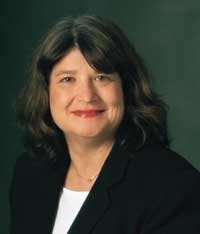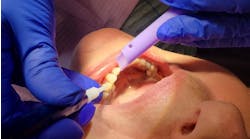Interview With ADTA's First Woman Chair: Milly Goldstein up-close
On a rainy New Orleans afternoon, I had the great privilege of interviewing Milly Goldstein. Milly has served on various committees in the American Dental Trade Association (ADTA), as well as being involved in Women in Dental Trade, Oral Health America, American Dental Assistants Association Foundation, and International Dental Manufacturers. She is president of the Harry J. Bosworth Company.
Milly is involved in community activities and enjoys many hobbies, not the least of which is spending time with her husband. She just finished a term as chair of the board of directors of the ADTA. The ADTA represents manufacturers, distribution labs, direct-sellers, peripheral research, training, and advertising companies. The members of ADTA serve the whole dental community.
What is it like to be the first woman chair of the ADTA?
I am the first woman chair in 120 years, which is how old ADTA is. I don't feel anything different being the first woman, I suppose, than anyone else who's held that position. If anything, it has made people aware that we haven't had a woman in this position before. The DMA (Dental Manufacturers of America) has a female in rotation, Carolyn Van Eck (GC America). She will be their first too. I have been on many committees, involved in exhibits, annual meetings, and strategic and long-range planning. I was appointed to the Board and then became an officer. I have known these people for 30 years and have grown up with some of them. It is a comfortable group. There is no real hierarchy — no big power plays. I believe you have to earn the right to serve and have a position. Women actively involved in any organization should request to be chair if they desire. I believe in making a change from within the system as opposed to making the system change to accommodate my views or concerns.
Being actively involved and being chair has been a wonderful experience. I have met some people whom I would have never met even as president of Bosworth. It has been an education beyond what I expected.
How did you get started in the dental industry/ADTA, and why have you stayed?
I was fortunate in that my dad only had two daughters. My dad owned Bosworth before me. When he passed away, I became the majority stockholder. I often say that I got into this business the old-fashioned way — I inherited it. I've been here for 25 years. I cannot think of a nicer group of people to work with whether it is in my own organization or across the industry, whether I am talking about my peers, my competitors, or my customers. This is a very nice industry. I used to say, I stay here because I don't know any better. But I enjoy it.
These are the reasons I got involved in the trade organization:
- This is the only job I've ever had. If you are the child of the owner, or when you inherit something, you look to develop and validate your own self-value. Getting involved in the ADTA allowed me to do this.
- I have no upward movement in my business. I'm the president. One way to feel that I am still growing is to get involved in extracurricular activities, for instance the ADTA.
- I also did it for the benefit of my company, to make my company stand out, and differentiate it from others.
- It allows me to give back to the community.
- Being involved gave my company a voice. A lot of people belong to organized dentistry, but how many actually voice their opinion? They may sit around and grumble about what's going on, but my theory is shame on you! It's your responsibility to get your point of view across. ADTA is the place where I have the same voice as everybody else. Bosworth and I are equal to everyone else.
Is there any advice you can give on key points women leaders should focus on? Is there anything specific you would say to a woman who wants to advance as a leader?
Be yourself. Don't try to be a guy. Don't try to be something you are not. Just be yourself and be willing to work for it. I think there is a real guys network, and we're not part of it. But women can create their own network, and by getting involved, you're going to become a part of the other network that's out there. It's not just going to come and invite you. Like with any group, if you are willing to get involved, put time and effort into it, and voice your opinion, you're going to find people will want you to get more involved. That's one way of growing within an organization instead of demanding or forcing them to acknowledge you. The ADTA is not a huge organization, although we represent a large portion of the business done in dentistry. It's a small group. Perhaps it is easier to grow in that size organization.
I would also tell women not to be afraid to start at the bottom. Sometimes there is a real benefit to learning an organization from the bottom up. When I was growing up, feminism was just starting. I remember someone once said, if they ask you to take notes, take notes. Whatever they ask you to do, do it. Eventually you'll get power out of what you're doing.
You have to be willing to grab some of that power and that growth as you're going and not just stay stuck where they put you. My advice is to get involved and be willing to do some of those jobs.
Get involved. Where does this fit in with your day job and personal life? How do these extracurricular activities fit in? I'm very lucky. At Bosworth, we talked about it a year before I assumed the chair. They are very generous of my various time commitments. But being clear about where these things fit in your life, why you're doing them, and how important they are to you is key.
Likewise, explain to the staff of the organization you're working with, "This is what you can expect from me." I am a person who wants to know what your expectations are and I will let you know what my expectations are. Your first job is your practice. For me, it is my work at Bosworth. You need to know how family, job, and community will work together.
How have women's leadership roles evolved? How has your own evolved?
One of the benefits of being involved in the ADTA is that I have been able to see many different styles of leadership. The leaders and senior managers of major dental companies are a part of ADTA, and I have learned from them. I don't think my style has changed. During my first board meeting, one of the things I tried to explain up-front was my style. I look for involvement and partici-pation from everyone. I have a good board, and they all participate.
There is a great deal of trust involved, too. Whether you are male or female, you have to earn that trust. In the committee or on the board, they have to know that you are going to act in the best interests of the organization. I'm a pretty direct person. I like to feel comfortable; then things are easy for me to do. That's my advice to any woman. Bring the environment to your own comfort level. Don't expect the organization or the venue to make it comfortable for you. I run the board informally. If someone is thinking about something that was two topics ago, I encourage that person to bring it up. If you're thinking about something that isn't clear, somebody else is, too. I'm an informal person and I'm the same at work. We have a factory here. I'm called by my first name; that's bringing it all to my comfort level. That's what I want to feel on committees or the board, like it is five of my folks sitting around a conference table. I try to recreate that in the organization.
How should women dentists approach the trade industry and buying?
Compare. Everybody makes good products. There are very few serious product errors in dentistry, so we are very fortunate. Dentists have to rely on their own research whether from a lecture, an exhibit, or in literature. They need to rely on their retail reps as well. Then, trust that you have the best information.
What can we learn from each other?
I am part of a group that started an organization called Women in Dental Trade. What we realized was that we didn't know each other. While a lot of organizations have female salespeople, as you go up the corporate ladder, there aren't that many women. Perhaps there is a way we can help you learn from our management issues. One of the hardest lessons in management is to let somebody else do it their way instead of your way. The other thing is, and I think this is a female trait, we tend to be friends with everyone. How do you criticize your office manager, your hygienist, or your assistant who is your friend? There are some management issues we share in dealing with staff members. We could share some horror stories as well as some triumphs. When you talk about networking, I don't think women dentists know who the women are who are involved in the trade. Part of our challenge is, at a minimum, to make sure that either we can be a voice for you or to make sure you're invited to the table. We need to know each other, sit down, and talk ... see if there are things that we can learn from each other.
What obstacles and challenges still remain?
I have heard time and again people say, "The female dentist isn't going to work as long." I actually have a feeling that they feel that way about the female executive, too. I have participated in conversations about who is the dental customer. As long as we see huge differences, or people acknowledge them, then there is an obstacle, because women are viewed differently. This is a wonderful opportunity for female dentists, because if the estimates are correct, you're a huge power base. We need to know — Are we marketing and communicating correctly to you? Are the colors right? Are the instruments easy to use? Do they fit okay? Just because this is how we always made it, do we have to make it that way forever? There are some marketing issues involved. There are ergonomic issues that have to be considered as well. Our market is changing. Our methods and products may have to change as well. I think AAWD is really starting to grow into its own as a group. I guess your first challenge is just to be counted. Whether you are a female dentist or a female executive, to be seen as an individual or as part of the group is the goal. Whether it's organized or whatever you're doing, they want to hear your vote U and you've got to get to that position. Thanks to AAWD, it's going to get easier. I would like to think that it would get easier within the dental trade.
How can women dentists support women in the trade industry, where they are also a minority?
A lot of people made fun of Women in Dental Trade. I say to them, "Look. It's just a new network. We don't know each other." We all sort of learned to live and grow in a male world. We need to make our own networks, which I think AAWD is firmly doing. We in trade may not be doing it as well. I think if we just know each other, that's one of the things that would help, that we have dialogue and are aware of each other. You won't be talking to a stranger, whether it's 3M, Dentsply, Bosworth, Roydent, GC, or whoever your distributors are. Let's make sure you know who the females are.
How has it been for you, being in a male-dominated industry?
I will tell you, getting involved in the trade association made it easier. If I had not been involved, I would have been very isolated and would not have known anybody. Involvement lets me know how my competitor acts. I've learned from some of my larger peers. I'm not intimidated because of the size of their business. Once again, it's all about that comfort level. For a my size of company, I'm seeing what the big folks do, and I'm learning from that and putting my own personality and spin on it.
What are the greatest challenges in your position?
As a woman, I don't want to be the last woman. When I took over last November [2001], I implored some of the women who were in the audience to get involved. One of the reasons that there haven't been more women is because we don't have a lot of companies owned by women. In organized dentistry, the female dentist has the same power as the male dentist, because she owns her own business.
Your level of involvement with an organization is often dictated by your boss. If your boss wants you to get involved, he or she has to give you the time, whether you are male or female. In a way, that has been a challenge.
I think people take me seriously in this role. I don't have to earn credibility, or I'd like to think I've earned it before. Some of the challenges that I face are not "female" ones. Asking women to get involved was probably the most political thing I've done. We had a position to fill and somebody at a board meeting once said, "You know, I think that's a job a woman would be better at," after announcing that he was going to be sexist. My comment was, "You know, I think women are better at most jobs." I couldn't pass it up. Only two women are on the board, Lori Paulson of ADC and me. That is probably an accurate reflection of the number of women in power in the industry. We have 18 people on our board, so 10 percent may be reflective of what senior management is in the industry. We actually did a major overhaul of our structure last year in an attempt to make sure the ADTA is going forward and raising nondues revenue. These are issues that face everyone. So, I think some of my challenges have nothing to do with me being a woman. The person following me is going to have these same challenges. You should ask the guys I work with. You may learn something different from them, because I would venture to guess that none of them have worked for or been led by a woman.
One of the things I haven't been able to do that I was able to do as a committee chair is have a greater sense of warmth there. I don't think you can achieve it while on the board, because you have people who are direct competitors there. We're sensitive to that competition as we make decisions — how it affects businesses so that it affects them evenly. But, we have gotten to the point where we're able to laugh about one another and tease one another.
What do you enjoy the most about your position?
Well ... they don't salute me ... they don't bow U they don't kiss my ring. I have asked to be called the Czarina. I don't want to be called the queen, but I love Czarina! The most enjoyable parts overall are two things. On a personal level, it is a feeling that this is an acknowledgement of the effort I've put in and that feels good all of the time. The other part is meeting people, whether it is within the industry or getting to meet the heads of dental divisions or owners of businesses. I've met some people within the industry and some within organized dentistry. I've met people like Dr. Margaret Scarlett (immediate past president of AAWD) and Dr. Hazel Harper (past president of the National Dental Association). I have met with the decision makers who select the programs and speakers who run various national and regional dental conventions. I've learned from clinicians and educators. I went to the Dean's meeting and to a breakfast with female administrators and deans. To listen to these people and have my view of dentistry heard has been great. To see and hear their view of the future of dentistry, developing the clinicians and leaders of tomorrow, to see all of that and learn from it is exciting.
What surprises you most about being chair of the ADTA or in the dental industry?
How few people know what ADTA is. It's a shame. We've been around for 120 years! Eighty percent of those in the industry who need to know about the ADTA probably do know. But more people need to know, and it's our fault that they don't. I think it's a sign of the future that you're talking to me about ADTA. In the past, dentistry and the trade were seen as two distinct entities. Actually, we're here to provide dentists with the products and services they need to be successful. Ultimately, we serve the same people AAWD does. So anything we can learn about each other is a benefit. This past year, ADTA took its first step in introducing itself to the profession — not organized dentistry (they know who we are), but to the average practitioner. Hopefully, we created an awareness about ourselves so that people understand what we stand for and what we're trying to do.
When you purchase pro-ducts or supplies or use a laboratory that is an ADTA member, you'll know that there is a certain level of quality for service that exists. This is a wonderful opportunity for us to expand some horizons.
We at ADTA are trying to make a brighter future for all of us. We want to make sure there's an industry for us to function in. We want to make sure dental professionals and not someone else are providing dental care in the future. That's one of the issues we're working on — who will provide dental care in the future? Will there be enough dentistry? We're looking at productivity issues — not more money, but more dentistry being done. We're working on programs that will provide you with sales professionals with a high standard of quality. Again, this is not one company; this is the dental industry looking at the dental knowledge that they have. We have a program in place now that's called "Introduction to Dental Industry." We teach about the different facets of dentistry.
We're looking into doing a mini-university program. We're trying to improve the way we do business and, hopefully, be of more value to you and your staff. We're trying to be fairly active on regulatory issues, which have to do with you folks indirectly. We've talked about ergonomics.
You have the industry behind you on a lot of these things, such as Prop65 and the amalgam issue. Industry is taking an active role through ADTA. We're trying to make things better by helping you fight your battles. We have had the Surgeon General come to our meeting. We were the first group, after their annual meeting, to have the ADA presentation of the Future of Dentistry. We're trying to stay ahead. We're trying to have a voice. We're trying to help shape this future that we're all going to share in.
Learning about all of those things and having all those opportunities is something that Milly and her company have realized by being a member of the ADTA. The AAWD can do the same thing for you. We're happy to share and happy to work together.







